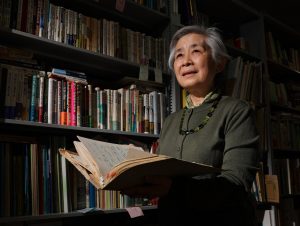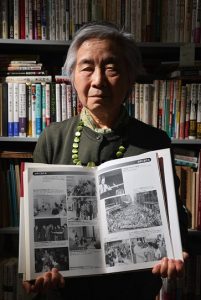Hiroshima Voices: “No Nukes, No War” Yoshie Kurihara, 76, Tokyo, member of the NPO No More Hibakusha Project
May 6, 2023
I truly hope that the leaders who will gather in the city of Hiroshima for the summit meeting can come to terms with A-bomb survivors’ history.
Yoshie Kurihara works in the secretariat of the Tokyo-based, non-profit organization No More Hibakusha Project, a group involved in the collection and communication of A-bomb survivors’ testimonies concerning their experiences in the atomic bombings and records of the campaigns they have waged to abolish nuclear weapons. In the 1980s, she worked as a staff member of the Japan Confederation of A- and H-Bomb Sufferers Organizations (Nihon Hidankyo). As Russia continues to threaten the use of nuclear weapons against Ukraine, Ms. Kurihara makes ambitious efforts to cast a light on the history of the movements waged by A-bomb survivors, who have worked all this time to call out the inhumane nature of nuclear weapons.
Click here to view the video
Russia’s behavior has made me believe there is a risk of nuclear weapons’ use any time there’s a war. Nuclear weapons persist in this world as the ultimate weapon of war. What if anything has been learned from the A-bomb survivors (hibakusha), a group of people who continue making the plea for “no more hibakusha”? I feel nothing but rage.
I hope people can focus on the activities in which survivors have been involved. Movements led by the survivors were a driving force behind the coming into force of the Treaty on the Prohibition of Nuclear Weapons (TPNW). Now is the time we must make an effort to preserve their work as an important asset of memory in the history of the human race.
When we were established in 2011, the original founders of our organization included the late Kenzaburo Oe, a Nobel laureate for literature. We hold in our archives in Tokyo and other locations throughout Japan about 20,000 items, including collections of A-bomb survivors’ testimonies, and have set to work on digitizing the materials.
We also have in our collections documents related to A-bomb survivor surveys conducted by civic and other groups. In addition to all that, I have had the opportunity to listen to the stories of experiences told by A-bomb survivors. One was a mother of two daughters, aged five and three, who was unable to save her children trapped under the rubble of their home, which had become engulfed in flames. “I abandoned my children and fled,” she explained while recalling the memory. She told me that was the first time she had shared with another person her long-harbored feelings of survivor’s guilt.
She added that the greatest joy in her life had been to watch her daughters grow. She had concealed her agony for more than 30 years after the end of the war. As someone listening to her story, I felt a tightening in my own chest and, as a result, my belief that nuclear weapons were a violation of our humanity only grew stronger. It just so happens, our organization also possesses in its archives the autopsy reports of the mother’s two daughters.
What kinds of activities have A-bomb survivors been involved in since the war? How have they felt while living their lives? I truly hope that the leaders who will gather in May in the A-bombed city of Hiroshima for the summit meeting of the G7 (attended by the Group of Seven industrialized nations) can come to terms with that history. By so doing, they might be able to open their eyes to the reality of the cruelty brought about by the atomic bombings. (Interviewed by Masaharu Nakagawa)









